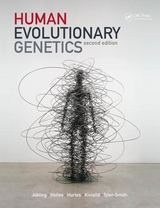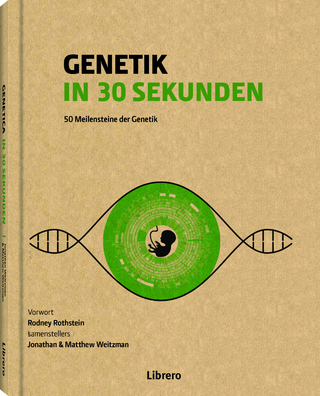
Human Evolutionary Genetics
Crc Press Inc (Verlag)
978-0-8153-4185-7 (ISBN)
- Titel erscheint in neuer Auflage
- Artikel merken
Human Evolutionary Genetics is a groundbreaking text which for the first time brings together molecular genetics and genomics to the study of the origins and movements of human populations.
Starting with an overview of molecular genomics for the non-specialist (which can be a useful review for those with a more genetic background), the book shows how data from the post-genomic era can be used to examine human origins and the human colonisation of the planet, richly illustrated with genetic trees and global maps. For the first time in a textbook, the authors outline how genetic data and the understanding of our origins which emerges, can be applied to contemporary population analyses, including genealogies, forensics and medicine.
Mark Jobling earned a degree in Biochemistry and a DPhil at the University of Oxford, UK, and in 1992 came to the University of Leicester, UK, where he is now a Wellcome Trust Senior Fellow in Basic Biomedical Sciences and Reader in Genetics. Mark's interests are in Y chromosome diversity as a tool for addressing questions in human evolution, genealogy and forensics, and also male infertility and haploid mutation processes. Matthew Hurles earned his degree in biochemistry at Oxford University, UK, and PhD in Leicester, UK. He was until recently a Research Fellow at the McDonald Institute for Archaeological Research at Cambridge University, UK, analyzing genetic variation with the aim of improving our understanding of the human past. He is now at the Wellcome Trust Sanger Institute near Cambridge, UK, investigating the unusual evolutionary dynamics of recently duplicated genomic regions. Chris Tyler-Smith earned his degree in biochemistry at Oxford University, UK, and PhD in Edinburgh, UK. For the last few years he has been a University Research Lecturer in the Biochemistry Department at Oxford, UK, working on the structure and function of human centromeres, and the application of Y-chromosomal DNA variation to the understanding of the human past. He is now at the Wellcome Trust Sanger Institute near Cambridge, UK, studying the genetic changes that have taken place during recent human evolution.
Section 1: Introduction
1. Why Study Human Evolutionary Genetics?
Section 2: How do we study Genome Diversity?
2. Structure, Function and Inheritance of the Human Genome
3. The Diversity of the Human Genome
4. Discovering and Assaying Genome Diversity
Section 3: How do we Interpret Genetic Variation?
5. Processes Shaping Diversity
6. Making Inferences from Diversity
Section 4: Where and When did Humans Originate?
7. Human Apes
8. Origins of Modern Humans
Section 5: How did Humans Colonize the World?
9. The Distribution of Diversity - Out of Africa and into Asia, Australia and Europe
10. Agricultural Expansions
11. Into New Found Lands
12. What Happens When Populations Meet?
Section 6: What use is an Evolutionary Perspective?
13. Understanding the Past and Future of Phenotypic Variation
14. Health Implications of Our Evolutionary Heritage
15. Identity and Identification
| Erscheint lt. Verlag | 9.12.2003 |
|---|---|
| Verlagsort | Bosa Roca |
| Sprache | englisch |
| Maße | 210 x 276 mm |
| Gewicht | 1806 g |
| Themenwelt | Naturwissenschaften ► Biologie ► Genetik / Molekularbiologie |
| Naturwissenschaften ► Biologie ► Humanbiologie | |
| ISBN-10 | 0-8153-4185-7 / 0815341857 |
| ISBN-13 | 978-0-8153-4185-7 / 9780815341857 |
| Zustand | Neuware |
| Haben Sie eine Frage zum Produkt? |
aus dem Bereich



